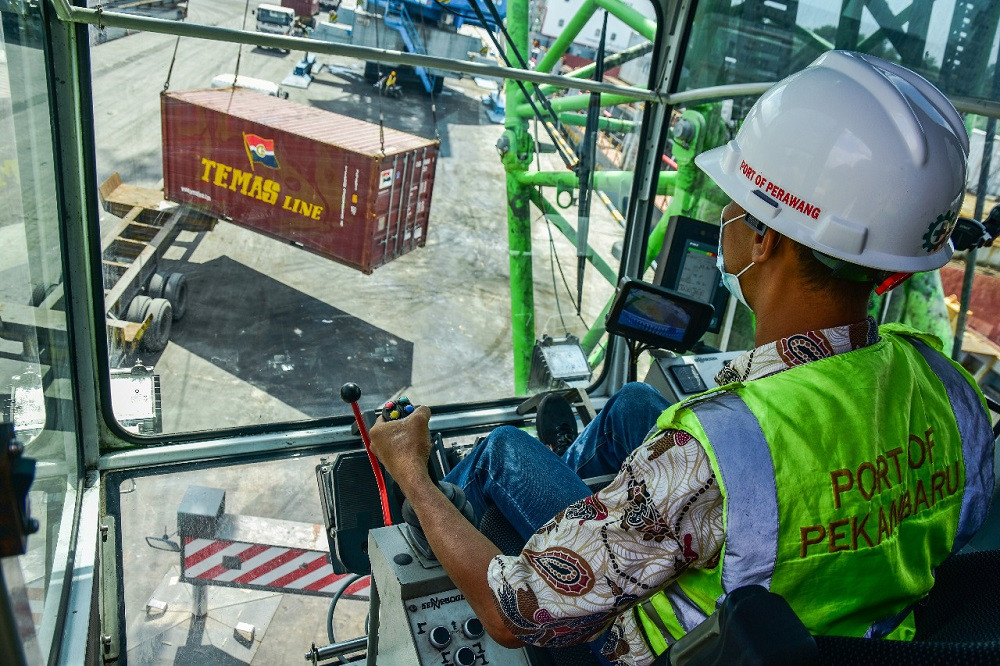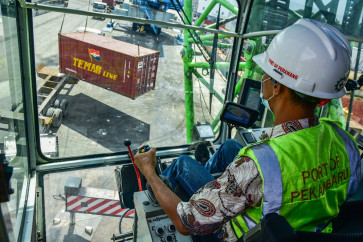Popular Reads
Top Results
Can't find what you're looking for?
View all search resultsPopular Reads
Top Results
Can't find what you're looking for?
View all search resultsPort integration: Keeping the crowding out effect at bay
Port integration policies can stimulate economic growth of cities and their effect grows with time.
Change text size
Gift Premium Articles
to Anyone
T
he much-anticipated merger of state-owned port operators has been finalized. This port integration policy was made official in a deed of merger of four state-owned ports, PT Pelabuhan Indonesia I, PT Pelabuhan Indonesia III and PT Pelabuhan Indonesia IV, all merging into PT Pelabuhan Indonesia II acting as the surviving entity. This merger effectively consolidates more than 90 percent of the market. One of the stated goals of this merger is to reduce the cost of logistics in Indonesia, which at this very moment is the highest among ASEAN countries.
Experiences from other economies demonstrate interesting outcomes of integration in the transportation sector. Port integration strategy in China is said to give an effective boost to the growth of transportation networks. Moreover, port integration policies can stimulate economic growth of cities and their effect grows with time. The case of China demonstrates that the impact of port integration is larger on small and medium-sized cities. This implies that merging of port operations could help make for more equitable economic development across the vast archipelago
But the experience in Argentina demonstrated inefficiencies in its port system. Owing to significant heterogeneity between port service providers, where private port operators are more efficient than state-owned ones, the integration of state-owned port operators in Argentina crowded out efficient private providers.
While many would be enamored by the idea of the state’s involvement in pretty much everything that we do, crowding out efficient private port operators is doing more harm than good for the economy. In a complete crowding out scenario, increased public investment does not effectively raise gross domestic product (GDP) because it simultaneously distorts the investment cost of the private sector as investments are driven out to friendlier economies.
The contrasting tale of China and Argentina suggests that there are two sides to port mergers. Port integration in Indonesia has been promoted as a solution to high logistics costs. Measures of efficiency and productivity will become more transparent to public auditors and users alike.
This all sounds good so far. However, the consolidation market power of state-owned port operators lends them the ability to set terminal handling charges (THCs) or lift on lift of (LoLo) costs above the market-clearing equilibrium like a monopoly would. Economics 101 warns us that monopolistic price setting is distortive, causing a dead-weight loss to the overall supply-chain economy, leaving everybody worse off.
This especially rings true if integration fails to shorten the waiting time in our ports. A 2020 Review of Maritime Transport published by the UN Conference on Trade and Development (UNCTAD) reports that the 2018-2020 median waiting time of container ships in Indonesian ports still hovers around one day. This is higher than neighboring Singapore and Malaysia (at 0.8 days) as well as Vietnam and the Philippines (0.9 days).


















